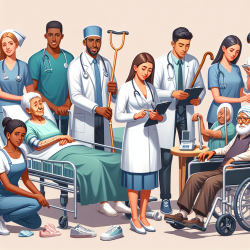The devastating effects of genocide extend far beyond the immediate loss of life. Survivors often carry physical and mental health burdens that can last a lifetime and even affect subsequent generations. As practitioners in fields such as mental health, social work, and public health, it's crucial to understand these impacts and improve our approaches to studying them.
The Need for a Genocide Studies Checklist
The research article "The long-term health consequences of genocide: developing GESQUQ - a genocide studies checklist" introduces a comprehensive tool designed to enhance the quality of genocide-related research. This checklist aims to provide consistent, high-quality data on the long-term health impacts of genocides.
What is GESQUQ?
The GESQUQ checklist was developed by an interdisciplinary team of experts from various countries, including Germany, Israel, the United States, and the United Kingdom. It consists of eight domains with 17 specific items that address key aspects of conducting genocide studies. These domains include:
- Ethical Approval: Ensuring ethical standards are met in all research activities.
- External Validity: Addressing sampling methods to reduce bias.
- Avoiding Misclassification: Ensuring accurate measurement of exposure and outcomes.
- Study Design: Selecting appropriate study designs and control groups.
- Confounders: Identifying and controlling for potential confounding factors.
- Data Collection Methods: Utilizing valid and reliable instruments for data gathering.
The Role of Practitioners in Genocide Research
The GESQUQ checklist is not only a tool for researchers but also a resource for practitioners who work with populations affected by genocide. By understanding and implementing these guidelines, practitioners can contribute to more accurate and impactful research outcomes. Here are some ways practitioners can use this checklist to improve their work:
- Enhance Data Collection: Use the checklist to guide data collection efforts, ensuring that all relevant factors are considered and accurately recorded.
- Avoid Bias: Apply the principles outlined in the checklist to minimize bias in your assessments and interventions with survivors.
- Cultural Sensitivity: Recognize the importance of culturally grounded concepts of distress when working with diverse populations affected by genocide.
- Ethical Considerations: Ensure that all interactions with survivors adhere to ethical standards, particularly regarding informed consent and confidentiality.
The Importance of Continued Research
The field of genocide studies is continually evolving, with new methodologies and technologies emerging. As practitioners, staying informed about these developments is crucial. Attending conferences, engaging with publications, and participating in webinars can help you stay up-to-date with the latest research findings and best practices.
The GESQUQ checklist represents a significant step forward in improving the quality and transparency of genocide research. By adopting these guidelines, we can better understand the long-term health impacts on survivors and develop more effective interventions to support them.
If you're interested in delving deeper into this topic, consider exploring additional resources or collaborating with researchers in this field. Your insights as a practitioner can provide valuable perspectives that enhance our collective understanding of genocide's impact on health.
The long-term health consequences of genocide: developing GESQUQ - a genocide studies checklist










